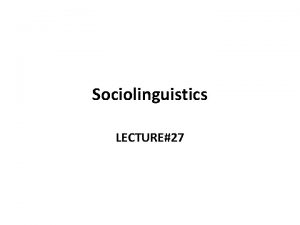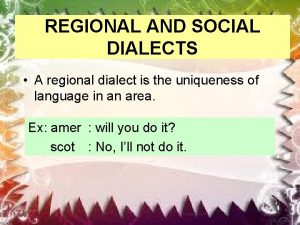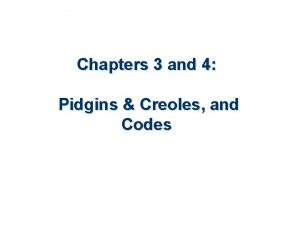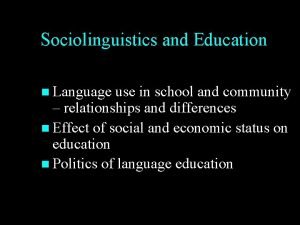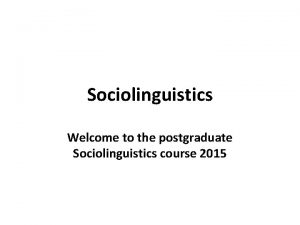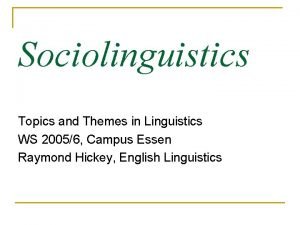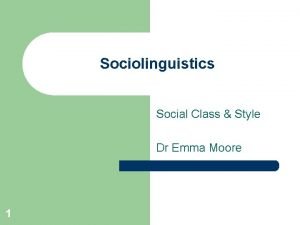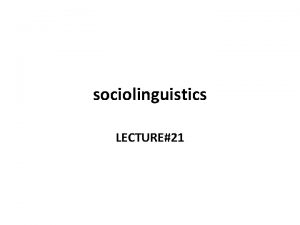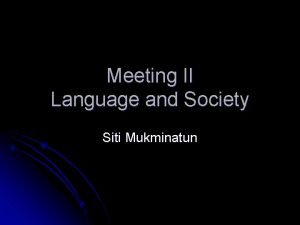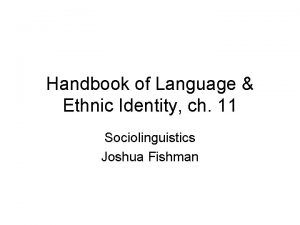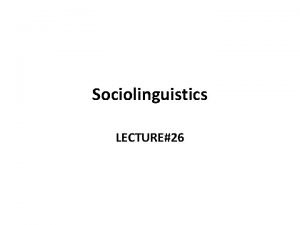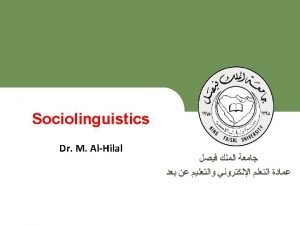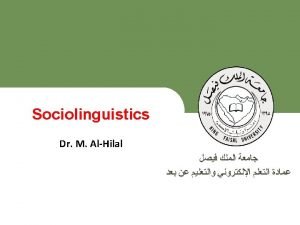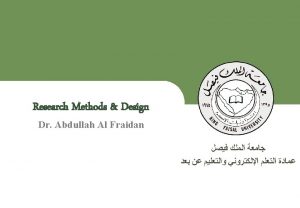Lecture 13 Sociolinguistics Deanship of ELearning and Distance

















- Slides: 17


Lecture 13 Sociolinguistics ﺑﻌﺪ ﻋﻦ ﻭﺍﻟﺘﻌﻠﻴﻢ ﺍﻹﻟﻜﺘﺮﻭﻧﻲ ﺍﻟﺘﻌﻠﻢ ﻋﻤﺎﺩﺓ Deanship of E-Learning and Distance Education [ ] ﻓﻴﺼﻞ ﺍﻟﻤﻠﻚ ﺟﺎﻣﻌﺔ King Faisal University

In this Lecture, we will discuss the following: 10. 3 The linguistic definition of standard English. 10. 3. 1 Linguistic variation 10. 3. 2 Logic and correctness 10. 4 Standard English and education. 10. 4. 1 Standard English in the school 10. 4. 2 Standard English and social equality Attitudes to language (Chapter 11) 11. 1 Introduction 11. 2 The evidence 11. 2. 1 Attitudes to Whole languages 11. 2. 2 Attitudes towards Varieties of a language 11. 2. 3. attitudes towards Words and interaction ﺑﻌﺪ ﻋﻦ ﻭﺍﻟﺘﻌﻠﻴﻢ ﺍﻹﻟﻜﺘﺮﻭﻧﻲ ﺍﻟﺘﻌﻠﻢ ﻋﻤﺎﺩﺓ Deanship of E-Learning and Distance Education [ 3 ] ﻓﻴﺼﻞ ﺍﻟﻤﻠﻚ ﺟﺎﻣﻌﺔ King Faisal University

10. 3 The linguistic definition of standard English. 10. 3. 1 Linguistic variation It is difficult to give an exact linguistic definition of Standard English because language varies in its use. E. g. People use different styles of spoken language depending on the situations they find themselves in: q where you are (at home, in the office, at the park). q whom you are talking to 1 -in terms of status (e. g. your boss) 2 - in terms of age (e. g. your little brother, your grandmother) 3 - in terms of intimacy (e. g. your best friend). q what you are talking about (e. g. the state of the nation’s economy, your opinion of a work of art, a football game) ﺑﻌﺪ ﻋﻦ ﻭﺍﻟﺘﻌﻠﻴﻢ ﺍﻹﻟﻜﺘﺮﻭﻧﻲ ﺍﻟﺘﻌﻠﻢ ﻋﻤﺎﺩﺓ Deanship of E-Learning and Distance Education [ ] ﻓﻴﺼﻞ ﺍﻟﻤﻠﻚ ﺟﺎﻣﻌﺔ King Faisal University

10. 3 The linguistic definition of standard English. 10. 3. 1 Linguistic variation The style of language you use depends on the formality of the context and the amount of planning that is involved. E. g. Our language varies in the following situations: 1 - A casual conversation between you and a close friend is an informal event which won’t be planned in advance. 2 - When you give a speech or lecture, you will plan what you say, and the way you say it ﺑﻌﺪ ﻋﻦ ﻭﺍﻟﺘﻌﻠﻴﻢ ﺍﻹﻟﻜﺘﺮﻭﻧﻲ ﺍﻟﺘﻌﻠﻢ ﻋﻤﺎﺩﺓ Deanship of E-Learning and Distance Education [ ] ﻓﻴﺼﻞ ﺍﻟﻤﻠﻚ ﺟﺎﻣﻌﺔ King Faisal University

10. 3. 2 Logic and correctness Two claims were made for standard English: 1 -Standard English is correct: this claim indicates that non-standard varieties are incorrect. 2 - Standard English is ‘logical’ or systematic and rule-governed: this claim indicates that non-standard varieties are not systematic and not rule-governed Linguists argue against these claims e. g. (1) The verb be in its distinction between singular and plural could be considered quite ‘illogical’. Singular I was you were s/he was Plural we were you were they were e. g. (2) There is no distinction in standard English between the form of be with Singular you (you were) and plural you (you were). ﺑﻌﺪ ﻋﻦ ﻭﺍﻟﺘﻌﻠﻴﻢ ﺍﻹﻟﻜﺘﺮﻭﻧﻲ ﺍﻟﺘﻌﻠﻢ ﻋﻤﺎﺩﺓ Deanship of E-Learning and Distance Education [ ] ﻓﻴﺼﻞ ﺍﻟﻤﻠﻚ ﺟﺎﻣﻌﺔ King Faisal University

10. 4 Standard English and education 10. 4. 1 Standard English in the school The motivation for making children speak standard English in school is explicitly given as the need to communicate effectively. e. g. In 1995, the British government launched the ‘Better English Campaign’, whose aim was to improve standards of spoken English around the country. ﺑﻌﺪ ﻋﻦ ﻭﺍﻟﺘﻌﻠﻴﻢ ﺍﻹﻟﻜﺘﺮﻭﻧﻲ ﺍﻟﺘﻌﻠﻢ ﻋﻤﺎﺩﺓ Deanship of E-Learning and Distance Education [ ] ﻓﻴﺼﻞ ﺍﻟﻤﻠﻚ ﺟﺎﻣﻌﺔ King Faisal University

10. 4. 2 Standard English and social equality 1 - There can be a relation between speaking a non-standard variety and social equality: 2 - John Rae links standard English to economic survival and success: “nothing more effectively condemns an individual to his class or ethnic ghetto than an inability to communicate clearly and logically in English” 3 - African American Vernacular English (AAVE) is seen as sub-standard and the obligation is firmly placed on its speakers to change. 4 - Speakers of a non-standard variety like African American Vernacular English (AAVE) may suffer discrimination at the hands of teachers and employers. ﺑﻌﺪ ﻋﻦ ﻭﺍﻟﺘﻌﻠﻴﻢ ﺍﻹﻟﻜﺘﺮﻭﻧﻲ ﺍﻟﺘﻌﻠﻢ ﻋﻤﺎﺩﺓ Deanship of E-Learning and Distance Education [ ] ﻓﻴﺼﻞ ﺍﻟﻤﻠﻚ ﺟﺎﻣﻌﺔ King Faisal University

10. 4. 2 Standard English and social equality 5 - Standard English is therefore seen as the appropriate dialect in the job market. E. g. In Britain, Gillian Shephard suggests that ‘those who have not mastered “our marvellous language” should not expect to be able to get a job’ (Daily Mail, 14 October 1994). 6 - There is a clear obligation on non-standard speakers to change if they wish to keep their rights as citizens to take up employment. ﺑﻌﺪ ﻋﻦ ﻭﺍﻟﺘﻌﻠﻴﻢ ﺍﻹﻟﻜﺘﺮﻭﻧﻲ ﺍﻟﺘﻌﻠﻢ ﻋﻤﺎﺩﺓ Deanship of E-Learning and Distance Education [ ] ﻓﻴﺼﻞ ﺍﻟﻤﻠﻚ ﺟﺎﻣﻌﺔ King Faisal University

Standards English and standards. There is a close relation between the language we speak and our social standards: Norman Tebbitt, MP, 1985 points out that: ‘If you allow standards to slip to the stage where good English is no better than bad English, where people turn up filthy at school. . . all these things tend to cause people to have no standards at all, and once you lose standards then there’s no imperative to stay out of crime. ” Similarly, John Rae 1982 points out that “Attention to the rules of grammar and care in the choice of words encourages punctiliousness in other matters. . . in such matters as honesty, responsibility, property, gratitude, apology and so on. (John Rae, The Observer, 7 February 1982) ﺑﻌﺪ ﻋﻦ ﻭﺍﻟﺘﻌﻠﻴﻢ ﺍﻹﻟﻜﺘﺮﻭﻧﻲ ﺍﻟﺘﻌﻠﻢ ﻋﻤﺎﺩﺓ Deanship of E-Learning and Distance Education [ ] ﻓﻴﺼﻞ ﺍﻟﻤﻠﻚ ﺟﺎﻣﻌﺔ King Faisal University

Attitudes to language (Chapter 11) 11. 1 Introduction People assign various attributes to language forms; they may feel that a language or variety of a language is Ø ‘elegant’ Ø ‘expressive’ Ø ‘vulgar’ Ø ‘guttural’ Ø ‘musical’ Ø or that one language form is ‘more polite’ or more ‘aesthetically pleasing or displeasing’ than another one ﺑﻌﺪ ﻋﻦ ﻭﺍﻟﺘﻌﻠﻴﻢ ﺍﻹﻟﻜﺘﺮﻭﻧﻲ ﺍﻟﺘﻌﻠﻢ ﻋﻤﺎﺩﺓ Deanship of E-Learning and Distance Education [ ] ﻓﻴﺼﻞ ﺍﻟﻤﻠﻚ ﺟﺎﻣﻌﺔ King Faisal University

11. 2 The evidence We can find evidence of positive and negative attitudes towards a wide range of linguistic issues: 11. 2. 1 Attitudes to Whole languages A. In Britain, although many languages are in daily use, only English has official recognition. A. For the English especially, multilingualism is viewed with suspicion and as a threat to national unity. A. In a speech to a meeting at the Conservative Party Conference in October 1997, Lord Tebbitt, a prominent Conservative, called for national unity saying, ‘we need common values, a common culture and a single language’. ﺑﻌﺪ ﻋﻦ ﻭﺍﻟﺘﻌﻠﻴﻢ ﺍﻹﻟﻜﺘﺮﻭﻧﻲ ﺍﻟﺘﻌﻠﻢ ﻋﻤﺎﺩﺓ Deanship of E-Learning and Distance Education [ ] ﻓﻴﺼﻞ ﺍﻟﻤﻠﻚ ﺟﺎﻣﻌﺔ King Faisal University

11. 2. 1 Attitudes to Whole languages C. Attitudes towards English in the United States have an association with national Unity. D. The promotion of English, both in Britain and in the United States, leads to the marginalization of the other languages which exist there. E. Minority languages and their speakers may be seen as divisive, even dangerous, and a threat to political, social or economic stability. ﺑﻌﺪ ﻋﻦ ﻭﺍﻟﺘﻌﻠﻴﻢ ﺍﻹﻟﻜﺘﺮﻭﻧﻲ ﺍﻟﺘﻌﻠﻢ ﻋﻤﺎﺩﺓ Deanship of E-Learning and Distance Education [ ] ﻓﻴﺼﻞ ﺍﻟﻤﻠﻚ ﺟﺎﻣﻌﺔ King Faisal University

11. 2. 2 Attitudes towards Varieties of a language We consider attitudes towards varieties of the same language. E. g. A. Fasold (1984) describes how the French spoken in Europe is seen to be more prestigious than that spoken in Canada, even by native Canadian French speakers B. People, usually high class, show negative attitudes toward non-standard varieties of English in Britain, or towards American varieties such as African American Vernacular English (AAVE) in the United States. C. The creation of verbs from nouns found more in American English than in varieties of British English is popularly criticised, as in this letter to The Times: “Could we stop assuming that any noun can automatically be turned into a verb? (The Times, 1 January 1994) ﺑﻌﺪ ﻋﻦ ﻭﺍﻟﺘﻌﻠﻴﻢ ﺍﻹﻟﻜﺘﺮﻭﻧﻲ ﺍﻟﺘﻌﻠﻢ ﻋﻤﺎﺩﺓ Deanship of E-Learning and Distance Education [ ] ﻓﻴﺼﻞ ﺍﻟﻤﻠﻚ ﺟﺎﻣﻌﺔ King Faisal University

11. 2. 3. Attitudes towards Words and Interaction A. In 1997, the British Psychological Society prohibited the use of the word subjects in its publications to refer to those taking part in psychological experiments. Such participants were to be referred to as individuals, people, students and so on. The letters to October 1997’s edition of The Psychologist describe this decision as ‘tosh’ or ‘trivial’, and one which leaves the eminent writers of these letters ‘baffled’. B. Attitudes to words may be so negative that the words may be considered not suitable for use at all. We often invent euphemisms to cover such words. E. g. Instead of ‘death’ and ‘dying’ we might talk about ‘passing away’. C. Some words are considered so unsuitable that they become totally taboo. ﺑﻌﺪ ﻋﻦ ﻭﺍﻟﺘﻌﻠﻴﻢ ﺍﻹﻟﻜﺘﺮﻭﻧﻲ ﺍﻟﺘﻌﻠﻢ ﻋﻤﺎﺩﺓ Deanship of E-Learning and Distance Education [ ] ﻓﻴﺼﻞ ﺍﻟﻤﻠﻚ ﺟﺎﻣﻌﺔ King Faisal University

11. 2. 3. Attitudes towards Words and Interaction D. Expressions such as right, like, you know, see you later are negatively treated: Some of these expressions may be associated with certain groups and may function as identity markers. E. g. The expression you know You know is considered to be a ‘marker of imprecise, uncertain or uneducated “lower class” speech’. D. When women speak, attitudes towards their talk are often negative; women’s talk is labelled as ‘chatter’ or ‘gossip’ about unimportant or ‘trivial’ topics. ﺑﻌﺪ ﻋﻦ ﻭﺍﻟﺘﻌﻠﻴﻢ ﺍﻹﻟﻜﺘﺮﻭﻧﻲ ﺍﻟﺘﻌﻠﻢ ﻋﻤﺎﺩﺓ Deanship of E-Learning and Distance Education [ ] ﻓﻴﺼﻞ ﺍﻟﻤﻠﻚ ﺟﺎﻣﻌﺔ King Faisal University

 01:640:244 lecture notes - lecture 15: plat, idah, farad
01:640:244 lecture notes - lecture 15: plat, idah, farad How is distance different from displacement
How is distance different from displacement Bell's seven criteria for language
Bell's seven criteria for language Regional and social dialect in sociolinguistics
Regional and social dialect in sociolinguistics What is pidgin
What is pidgin Sociolinguistics and education
Sociolinguistics and education Language
Language The ratio of input distance to output distance
The ratio of input distance to output distance Variationist sociolinguistics
Variationist sociolinguistics Sociolinguistics topics for presentation
Sociolinguistics topics for presentation What is overt prestige
What is overt prestige Sociolinguistic
Sociolinguistic Sociolinguistic variation
Sociolinguistic variation What is sociolinguistics
What is sociolinguistics Solidarity social distance scale
Solidarity social distance scale Ethnicity in sociolinguistics
Ethnicity in sociolinguistics Code switching in sociolinguistics
Code switching in sociolinguistics Register (sociolinguistics)
Register (sociolinguistics)


